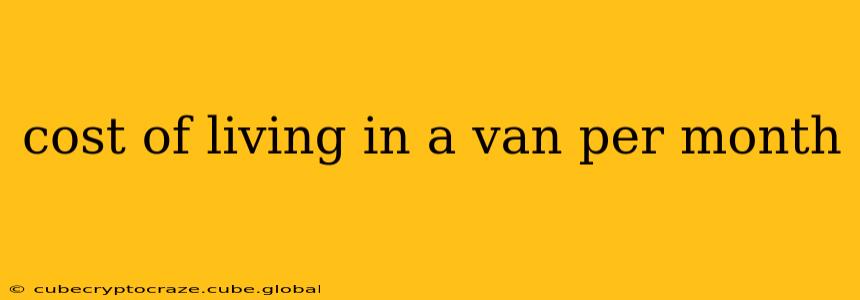Living in a van, often romanticized as a liberating escape from traditional living, presents unique financial considerations. While the allure of freedom is undeniable, understanding the true cost of this lifestyle is crucial before taking the plunge. This comprehensive guide breaks down the monthly expenses you can expect, helping you budget effectively and enjoy your van life journey without financial stress.
What are the major costs of van life?
The total cost varies significantly based on your lifestyle, location, and van setup. However, the major expense categories remain consistent. These include:
-
Parking & Camping Fees: This is often the largest variable cost. Free dispersed camping is possible in some areas, but access to amenities often requires fees at campgrounds or RV parks. City parking regulations also vary widely, and overnight parking restrictions can be significant. Expect to budget for a range of options, from free dispersed camping to paid campsites costing upwards of $30-$50 per night.
-
Fuel Costs: Fuel expenses are substantial, especially if you travel extensively. Your mileage will depend on your van's fuel efficiency and your travel style. Consider the cost of gas, diesel, or propane, depending on your van's engine type. Remember to factor in fluctuating fuel prices.
-
Food Costs: Grocery costs can vary depending on your dietary preferences and cooking habits. Living in a van often involves more meal prepping, which can be cost-effective. However, access to affordable grocery stores may be limited in some areas.
-
Maintenance & Repairs: Your van is your home, so regular maintenance is crucial. Expect costs associated with oil changes, tire rotations, repairs, and potential breakdowns. A well-maintained van can help minimize these costs, but unexpected repairs can significantly impact your budget.
-
Insurance: Van insurance costs are often higher than standard car insurance because of the nature of van life and the potential for extensive use. Shop around and compare quotes from different insurance providers.
-
Utilities: While lower than a traditional home, utilities still apply. This includes propane for cooking and heating (if applicable), electricity from solar panels or hookups, and internet access (data plans or Wi-Fi hotspots).
-
Vehicle Payments (if applicable): If you financed your van conversion, monthly payments add another significant cost.
-
Healthcare: Healthcare expenses remain a crucial part of any budget. Health insurance premiums and potential medical costs must be factored into your van life calculations.
How much does van life really cost per month?
This is a question without a definitive answer. The monthly cost can range from $500 to $3,000 or more, depending on the factors discussed above. A minimalist lifestyle focusing on free camping and budget-friendly meal planning can keep monthly expenses lower, while extensive travel and frequent campground stays can drive the costs up.
How can I reduce the cost of van life?
Several strategies can help you reduce your monthly expenses:
-
Minimize Travel: Extensive travel increases fuel and camping costs. Spending more time in a single location can significantly reduce your expenses.
-
Embrace Free Camping: Research and utilize free dispersed camping opportunities to avoid campground fees.
-
Cook Your Own Meals: Meal prepping and cooking your own food is significantly more economical than eating out frequently.
-
Maintain Your Van: Regular maintenance prevents expensive repairs down the line.
-
Find Affordable Parking: Explore options such as Walmart parking or overnight stays at truck stops. (Always check local regulations before doing so).
-
Utilize Free Wi-Fi: Take advantage of free Wi-Fi at libraries, coffee shops, and other public spaces.
-
Solar Power: Invest in solar panels to reduce reliance on hookups and campground electricity.
What are some unexpected costs of van life?
Beyond the core expenses, several unexpected costs can arise:
-
Emergency Repairs: Unexpected breakdowns or repairs can be expensive. Saving for an emergency fund is crucial.
-
Unexpected Weather Events: Storms or harsh weather can require unexpected expenses for repairs or alternative shelter.
-
Health Issues: Medical expenses can be unpredictable, highlighting the need for adequate health insurance.
How can I plan a realistic van life budget?
Start by listing all potential monthly expenses, including variable costs like fuel and camping fees. Then, research realistic cost estimates for your chosen region. Track your expenses meticulously during your initial months in a van to fine-tune your budget. Remember that emergencies happen, so including a buffer for unexpected costs is essential. A detailed budget ensures your van life journey remains financially sustainable and enjoyable.
